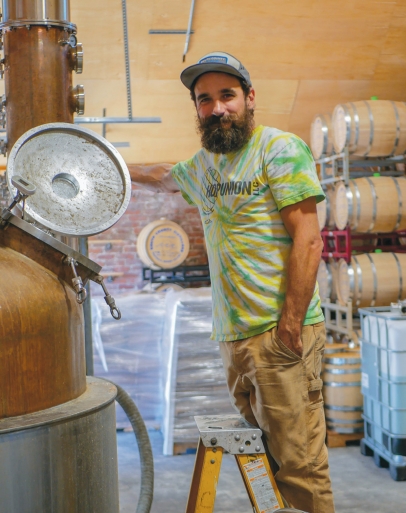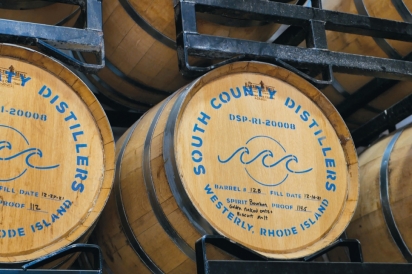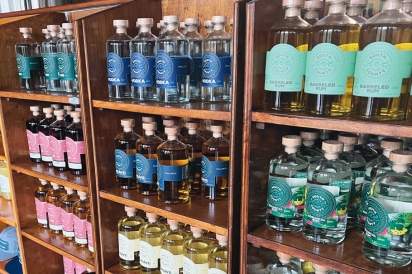South County Distillers from Grain to Glass
We should probably start by pointing out that most spirits sold in stores are mass produced using alcohol from bulk distillers, many of which are in the Midwest. Ornate terms such as “small batch” or “handcrafted” are largely unregulated and are overused to the point of deception. Neutral grain spirits are sourced from producers making the 190-proof bulk product and the commercial brands—regardless of the packaging or price—are selling their spirits using the generic ingredient.
Not so with South County Distillers (SCD).
Based in Westerly, and located on the premises of the Grey Sail Brewing Co., SCD is quickly becoming a standout in the craft distilling arena.
“We were friends for a long time before partnering for this project,” says Alan Brinton, retired chemical engineer and founder of Grey Sail Brewing Co., when referring to partner Ryan Gwozdz (pronounced “Gahvoosh”). Ryan is the driving force behind the distilling operations on the Grey Sail campus.
Ryan worked as head brewer at Mayflower Brewing Co. in Plymouth, Massachusetts, for over a decade, but he always fancied taking the next step from beer into distilling. “I’d get home after a long day at the brewery and start working with different mash bills,” says Ryan. (Mash bill is an industry term referring to the combination of grains, essentially the recipe, used to make the spirit.) He had a small still at home that he used to develop recipes and explore ideas.
That, together with lots of reading and research, prepared him for where he is now. “I made a lot of small batches and kept accurate records so scaling up would be possible,” Ryan says.
After much discussion, Ryan and Alan developed a business plan in 2018, and the two brewers started the distillation operation in March 2020—just as the Covid lockdown began. They made hand sanitizer initially, but also started putting some special spirits into barrels to age, or “lay down,” in industry parlance. It was a tough time to start a new venture but, as is often the case, dedication and quality have a way of enduring.
These days, the distillery is producing a range of products, including vodka, botanical gins, rum, rye, bourbon, an agave spirit, limoncello and more. “We do about four mashes a week,” says Ryan. Non-GMO grains such as corn, rye, wheat and barley arrive whole from farms and go straight into the milling machine, where they are ground, mixed with water and sent over to a fermentation tank. “While that ferments, we can start another mash bill,” he adds.
The first batch goes through a “stripping run” that separates the grains from the liquid resulting in “low wine”; the spent grains go offsite to feed cows at local dairy farms. The low wine goes through several distillations that then become the various spirits produced by SCD.
It is obvious that both Alan and Ryan enjoy the artistry associated with the craft of small-batch distilling. “The possibilities are endless,” says Ryan. “Just within the realm of gin, the options for blending natural botanicals to enhance flavor are fascinating.” The flexibility associated with small-batch distilling opens up a whole new world of creativity for the clever minds behind the SCD project.
When asked about best sellers, both Alan and Ryan have to point to the canned craft cocktails. While it is perhaps more rewarding to create pure, authentic artisan spirits by hand and from scratch, not every home bartender knows what to do with them. “The craft distilling industry is not as mature as craft brewing has become,” says Ryan. “It is more technical, and requires a deeper understanding in order to foster customer appreciation.”
It is true that a lot goes into handcrafted spirits, and the complexity is deep, but it’s natural that a simpler, more approachable product will be the most popular one in the lineup.
“The [canned] craft cocktails are huge,” says Alan. “They are a viable alternative to beer, and a great way to introduce our spirits to the public.” With a canning operation already in place at the brewery, it was also an easy next step to make four-packs for take-out or distribution.
As luck would have it, one of their other best sellers is also one of the most labor-intensive products in the lineup. SCD’s Limoncello is a delightful lemon liqueur that requires Ryan to peel 600 to 700 lemons for each batch. Keeping an eye on the temperature in the mash tun, he seems to take it all in stride. “It’s all part of the fun,” he quips.
For those who enjoy a quality handmade beverage, keep tabs on SCD in the months ahead. The team has been steadily producing a number of spirits that are sitting in beautiful oak casks, aging to perfection before the big reveal. Besides the distillery space at 63 Canal Street in Westerly, they have another warehouse nearby where they are storing oak barrels filled with special elixirs to be released as they become ready.
William Tuthill is a writer who attended Cornell University’s College of Agriculture and Life Sciences in Ithaca, NY. He lives with his family in Jamestown.
South County Distillers
63 Canal St., Westerly, RI
For taproom and distillery store hours, as well as where to find their hand-crafted spirits, visit SouthCountyDistillers.com.







